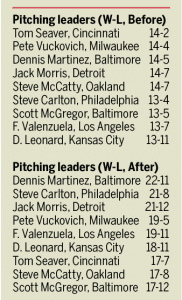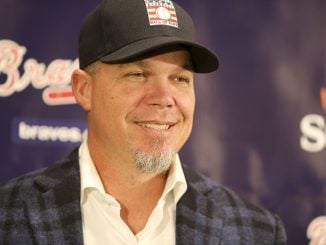The coronavirus has canceled just about all of sports for the time being, and no one knows when we’ll get back to the good old days, with games every day.
All the hand-washing, social distancing and staying inside can’t change any of that. But there is one thing we can do.
The NBA, NFL, NHL and MLB have all lost games to labor strife in the past. The NHL has had three seasons shortened and one canceled. The NFL had two seasons shortened. MLB had three seasons impacted by labor woes, and the NBA had games wiped out in two seasons.
In an ongoing series, while none of us have any live sports to watch, we’ll be un-canceling lost games from our past (see the results from “Uncanceled: The 1994 baseball strike”). We’ll do this not by any computer or video game simulations or by statistical tricks, but by actual action that took place on the field or ice. Basically, for each canceled game, we’ll use the next time those two teams played (at the same venue) as a “makeup game.” For example, we would use games from the 2020-21 NBA and NHL seasons to fill in any holes left by the coronavirus in this year’s schedule.
This week, we’ll look at the 1981 baseball strike that caused a weird split season.
The strike came in the middle of the year, so when play resumed, MLB declared the teams leading their divisions when the strike hit as the “First-Half Champions” and set everyone’s records to 0-0 for the second half. The first- and second-half champs then played in an extra round of playoffs.
There was no wild card, which means that the teams that actually finished with the best overall records in NL East (St. Louis) and NL West (Cincinnati) didn’t make the postseason. Both teams finished second in the first and second halves to get shut out.
The 1981 season was the year of Fernandomania. Rookie Fernando Valenzuela was one of several pitchers flirting with a 20-win season before the season was interrupted. It was also the heyday of the stolen base, and both Tim Raines and Rickey Henderson had shots at 100-steal seasons. And the American League finished with an odd four-way tie for the home run title.
So there was plenty of individual statistical business to be worked out.
Let’s go ahead and finish the season.
 American League East
American League East
The Yankees won the first half and beat the second-half champion Brewers in the Divisional Round, then swept the A’s in the LCS before losing the World Series to the Dodgers. Neither the Yankees nor the Brewers ended up winning the division. Six of the seven teams in the division had combined first- and second-half records over .500 and five of them were within 2.5 games of first. The Red Sox went an astounding 37-17 (.685) over the makeup games to win the division by six games.
 American League West
American League West
The Oakland A’s had a five-game lead in the combined first- and second-half standings, but the makeup games took place in Oakland’s disastrous 1982 season. The A’s went 20-33 (.377) in the makeups and fell out of first. The second-half champion Kansas City Royals went 38-24 in the makeups to steal the division, despite trailing by 11 in the games that were actually played in 1981.
 National League East
National League East
The Cardinals received their split-season deprived divisional title, beating first-half champion Philadelphia by four games and second-half champ Montreal by five.
 National League West
National League West
The Reds also received their divisional title, but it was a tight race. Cincinnati and the Dodgers finished in a flat-footed tie at 90-72. The Reds then eliminated the Dodgers, who won the real-life 1981 World Series, in a one-game playoff to reach the LCS. The second-half champion Astros finished a distant third.

 Individual accolades
Individual accolades
The American League home run race had a twist ending. Three of the four players tied for first missed significant time in the makeup games due to injury. Eddie Murray missed seven games, Tony Armas 12 and Bobby Grich five. As a result, Milwaukee’s “Stormin’” Gorman Thomas, who was one home run behind the foursome, managed to win the home run crown with 11 dingers in the makeup games.
 Henderson, who had the luxury of playing makeup games in his record-setting 130 steal season in 1982, overtook Tim Raines for the MLB steals title despite trailing by 15 at the end of calendar year 1981. Both fell just short of the 100-steal mark, however.
Henderson, who had the luxury of playing makeup games in his record-setting 130 steal season in 1982, overtook Tim Raines for the MLB steals title despite trailing by 15 at the end of calendar year 1981. Both fell just short of the 100-steal mark, however.
Fernando didn’t make it to 20 wins, but Steve Carlton, Jack Morris and Dennis Martinez did.
The champion
The Royals swept the Red Sox in the ALCS, winning two at home and wrapping up the best-of-five series with a Game 3 win in Boston.
The Cardinals swept the Reds in the NLCS, winning its first two on the road and then wrapping up the series at home in Game 3.
Then it was on to the World Series, which was a pre-match of the 1985 Series between the two Missouri teams. It also means that — in the days before interleague play — the ’85 series games oddly served as the makeup games for the 1981 Series as well.
The Royals ended up winning both world championships in dramatic seven-game battles.


